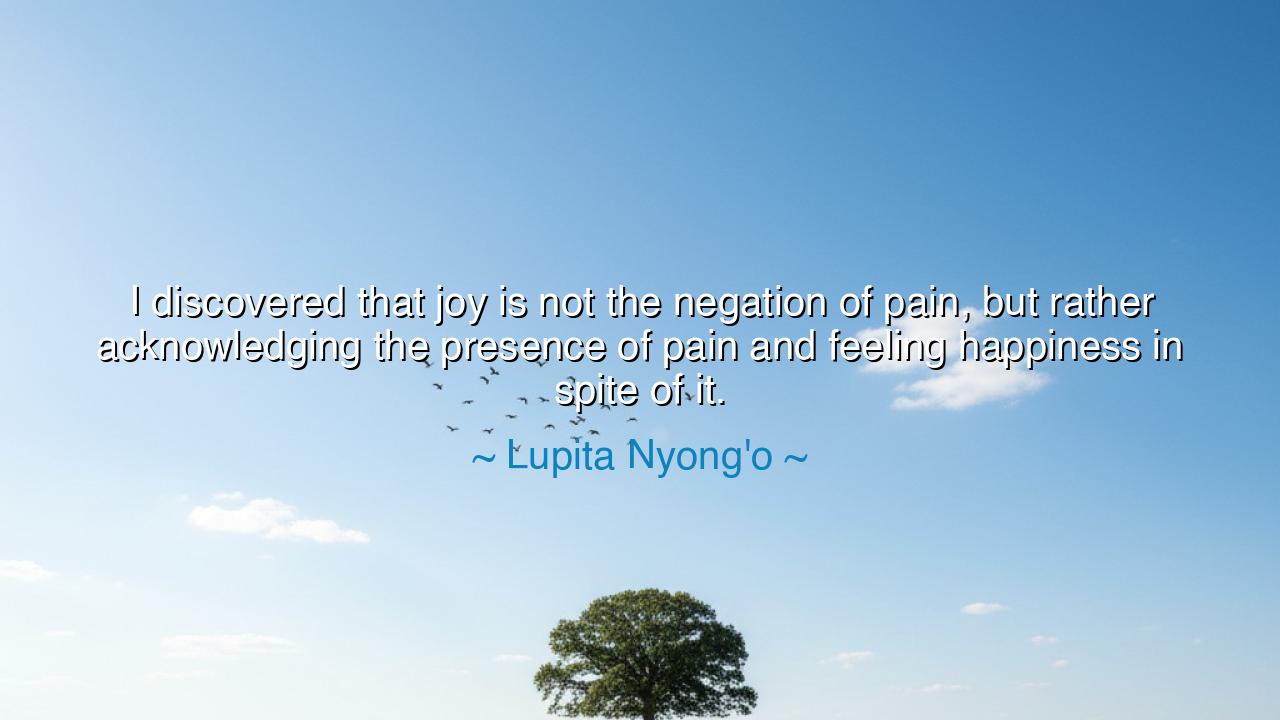
I discovered that joy is not the negation of pain, but rather
I discovered that joy is not the negation of pain, but rather acknowledging the presence of pain and feeling happiness in spite of it.






In her luminous reflection, Lupita Nyong’o speaks not as an actress but as a philosopher of the heart: “I discovered that joy is not the negation of pain, but rather acknowledging the presence of pain and feeling happiness in spite of it.” In this, she names a truth known to the wise of every age—that joy is not the absence of sorrow, but its companion; that pain and happiness are not enemies, but twin threads woven through the same tapestry of being. Her words rise from the furnace of experience, shaped by struggle, perseverance, and self-discovery. Like light piercing a storm, this quote teaches that joy does not wait for suffering to end—it blooms within it.
The ancients understood this paradox well. The Stoic philosophers, from Epictetus to Marcus Aurelius, spoke of serenity not as the absence of hardship, but as mastery of the soul amid it. They believed that the true strength of spirit lies not in evading pain, but in transforming it into wisdom. Lupita’s insight stands in this same lineage, reminding us that the human heart, though fragile, is capable of resilience so deep that it can sing even as it bleeds. Joy, in her vision, is not a fragile pleasure that shatters upon contact with grief; it is the quiet, enduring fire that survives the storm.
Her discovery is born of a personal pilgrimage. Lupita Nyong’o, who rose to prominence through 12 Years a Slave, portrayed unspeakable suffering on screen—and through that role came to confront the universal pain that shapes all human lives. Yet rather than fleeing from sorrow, she learned to acknowledge its presence, to gaze at it without fear. That act of acknowledgment is key, for denial gives pain its power. When we face it, we reclaim our strength. In doing so, she found that happiness was not something waiting on the far side of hardship, but a state of grace that coexists with it. This revelation transforms suffering from an enemy into a teacher, one that sharpens gratitude and deepens love.
History, too, offers us a mirror of this truth. Consider the life of Nelson Mandela, who endured twenty-seven years of imprisonment, separation, and cruelty. Yet when he emerged from Robben Island, he did not carry vengeance in his heart, but peace and joy. He said, “As I walked out the door toward the gate that would lead to my freedom, I knew if I didn’t leave my bitterness behind, I’d still be in prison.” In this, Mandela embodies Lupita’s revelation—that happiness in spite of pain is not delusion, but liberation. It is the triumph of spirit over circumstance, the victory of the soul that refuses to be defined by its wounds.
Such wisdom demands courage, for it asks us not to escape pain but to welcome it into the circle of life. To say, “Yes, I have suffered,” and yet to smile; to weep, and yet to love. This is the courage of acceptance—not passive endurance, but active grace. It is the same spirit seen in the teachings of Buddha, who found enlightenment not by rejecting suffering, but by understanding its role in awakening compassion. In that understanding lies freedom, for the heart that ceases to fight pain begins to find joy even amid its shadow.
To live by Lupita’s teaching, one must learn the art of presence. When grief arises, do not rush to bury it beneath distraction; instead, breathe and feel it fully. Yet within that feeling, look for the small lights—the laughter of a friend, the warmth of the sun, the memory of love. These are not opposites of pain; they are its counterbalance. Practice gratitude, not as denial, but as remembrance that life is vast enough to hold both tears and laughter, loss and beauty. For as the ancients said, “The same ocean that drowns also carries ships.”
Thus, the lesson of Lupita’s words is both tender and powerful: Do not wait for pain to vanish before you begin to live. Let your joy be brave enough to coexist with sorrow. Let it rise, quietly but defiantly, in the heart of your trials. For happiness, when it comes from acknowledgment rather than avoidance, is not fleeting—it is eternal. It is the song of the soul that has learned to love even the broken places. And so, dear listener, remember this: pain is inevitable, but joy is a choice, and when chosen, it becomes the truest act of human strength.






AAdministratorAdministrator
Welcome, honored guests. Please leave a comment, we will respond soon